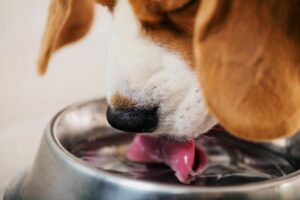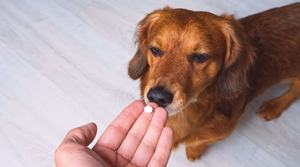
Reviewed & Fact-Checked by
Dr. Paula Simons
Veterinarian (DVM)
Learn more about our Veterinary Review Board »
Taurine is not considered an essential amino acid for dogs. This is because some dogs can naturally process it in the body from the dietary amino acids cysteine and methionine.
And, since taurine isn't considered an essential amino acid, AAFCO dog food nutrient profiles establish no minimum requirement for taurine.
With that said, some breeds may require taurine added to their diets if they have heart related medical conditions secondary to taurine deficiency.
A taurine deficiency may contribute to the incidence of dilated cardiomyopathy (DCM) in genetically susceptible dogs and even those who are not susceptible.
The evidence points out that a grain-free/low-protein kibble in certain breeds of dogs increases their risk for taurine deficiency-related DCM.
What is Taurine Deficiency?
As the name suggests, taurine deficiency is the lack of or inadequate levels of taurine in the body. This condition affects both cats and dogs but manifests in different ways for each.
Usually, dogs can process this amino acid, but if the ability to process is impaired, then you must provide this amino acid by feeding them high-taurine containing diets or supplements.
What Causes Taurine Deficiency in Dogs?
Genetics is one of the primary causes of taurine deficiency in dogs. Some dog breeds are more predisposed to developing this condition from a genetic disorder.
In this case, dogs that get this condition need a special diet containing taurine or supplementation.
In addition, Cystinuria is a genetic disease that predisposes the dog to the deficiency. It can interfere with the absorption of amino acids in the body resulting in reduced uptake of taurine and other amino acids.
This condition also causes kidney stones. Since this is a genetic condition, you cannot do much to prevent its impact on your dog’s health.
Are Certain Breeds More At Risk of Developing Taurine Deficiency?
As mentioned above, one of the primary causes of taurine deficiency in dogs is genetics.
Some breeds are not able to synthesize the amino acids due to some genetic malfunction or defects. In addition there are some breeds or breed mixes known to be susceptible to dietary Dilated Cardiomyopathy.
Here are the breeds of dogs that are at high risk.
- American Cocker Spaniels
- English Setters
- Golden Retrievers
- Labrador Retrievers
- Saint Bernards
- Portuguese Water Dogs
- Newfoundlands

For this reason, owners need to supplement this vital amino acid in their pet's diet to help prevent the occurrence of the condition.
However, it is important to note that some foods are not advisable for these types of dogs. These include lamb and rice, high-fiber diets and low-protein meals.
Studies show that animal muscle tissue, specifically marine animals, are rich in taurine, whereas plant-based ingredients have either low or undetectable amounts.
Grain-free low-protein dog foods are very high in carbohydrates, which displaces amino acids.
If you have breed or breed mix susceptible to DCM talk to your veterinarian about offering him the correct amounts of taurine supplements.
Evidence suggests that cooked meat, including poultry (turkey and chicken), and (white) fish have significantly higher amino acid bioavailability and digestibility.
Signs Your Dog Has Taurine Deficiency
Here are the clinical signs to look out for in a dog with taurine deficiency.
- Heavy panting without physical activity or difficulty breathing
- Coughing
- General weakness and fatigue
- Lost eyesight and watery eyes
- Fainting or sudden collapse
- Heart failure
- Ascites or fluid build up in the abdomen
- Arrhythmias
How is Taurine Deficiency Diagnosed in Dogs?
If you suspect your dog has clinical signs of taurine deficiency, it is essential to seek medical attention. You will need to provide a thorough medical history for your veterinarian. That will include how long the dog has suffered the clinical signs and recording of the signs.
This information is essential to rule out potential diseases affecting your dog.
Your veterinarian will do a complete physical examination of your dog. A cardiac examination is very important and your veterinarian will assess for a heart murmur, arrhythmias, or abnormal lung sounds.
Urinalysis may reveal some changes in the urine due to Cystinuria. It is condition that affects the normal absorption of amino acids.
Breeds that suffer from this condition may have blood in the urine and bladder stones. In such a case, the disease is treated on its own.
If your veterinarian suspects that your dog has a taurine deficiency, evaluation of blood taurine levels will be performed with bloodwork. If a heart condition is present, the veterinarian will request chest x-rays and other measures to evaluate the extent of the disease like an echocardiogram.
If you suspect your dog is displaying signs of DCM already, urgently seek a consultation with a veterinary cardiologist and have an echocardiogram and taurine testing obtained simultaneously. Do not change their diet, or supplement prior to the appointment.
How is Taurine Deficiency Treated?
Taurine deficiency treatment will vary with the underlying cause of the condition.
Taurine deficiency treatment will vary with the underlying cause of the condition.
Depending on the extent of symptoms and the measured taurine levels in the blood, your vet will advise on immediate measures to manage this condition.
For severe cases associated with DCM, your veterinarian will take additional measures to treat the heart disease first.
If your dog has bladder stones, a surgical procedure will be performed to remove the stones since they are too big to pass on their own.
Generally, taurine deficiency treatment starts by attending to individual clinical signs and underlying conditions. If overlooked, it might bring about a relapse of the disease.
Treatment involves increasing taurine intake by supplementing taurine in the diet. Your veterinarian will advise on appropriate dietary changes that you will take to ensure an adequate supply of taurine.
You will need to give your dog specific food as instructed by the veterinarian.
Depending on the breed and condition of your dog, you might have to supplement taurine all through until your vet tells you otherwise.
Recovery of Taurine-Deficient Dogs
It is essential to follow the correct amount of taurine supplementation at specific times as instructed by your veterinarian. You must administer the dosage daily until the veterinarian directs you to discontinue. During the recovery process, your veterinarian may also prescribe other medication to manage concurrent diseases.
Additionally, keep in touch with the veterinarian and communicate any strange behaviors or clinical signs.



